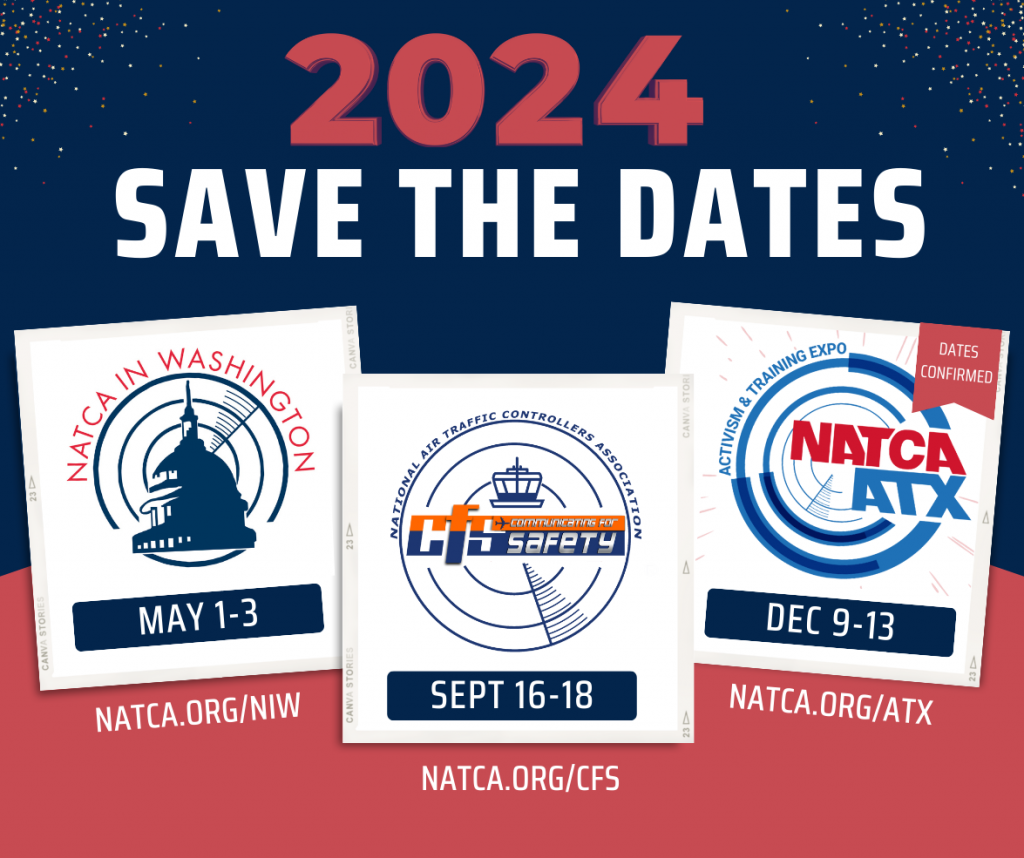
January 2024 New England Bi-Monthly Regional Update #2
From Bryan Krampovitis, NATCA New England ARVP
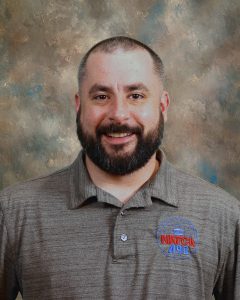
A little-known benefit, paid for by NATCA and available to all members, is AMAS, the Aviation Medical Advisory Service. Annual medicals can be a source of stress for our members, and AMAS is there to alleviate some of that stress. They are available to provide advice on everything from how to precisely list physician visits, conditions, and medications on your medical form, advice on what a medical diagnosis would mean for your medical, and guidance on which medications will be approved for use versus disqualifying or requiring a waiver.
Whenever a member comes to me with a question regarding their medical, the very first thing I do is get them in contact with AMAS. I also take any opportunity I come across personally to call AMAS, gather information, and “audit” the service so I can confidently recommend our members to use it. Recently, I had a reason to give them a call, and as always, their service was five-star. I called, provided my information, and received a call back from a doctor within 30 minutes who was able to answer my question and reassure me that I had no cause for concern when calling the flight surgeon later that day.
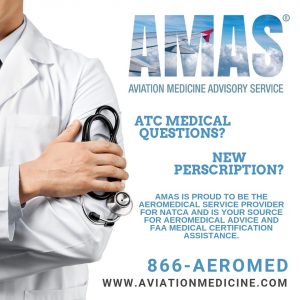
AMAS also offers less-used services for more serious situations. They will act as your FAA liaison and deal with the FAA directly when needed. They will collaborate with your treating physicians and the Oklahoma City medical office to get your medical back or reissued after more serious medical issues. Depending on the situation, this is provided to our members either at no cost at all or at deeply discounted rates depending on the circumstances.
I recommend everyone take a minute and go to the AMAS website. There is a wealth of knowledge there about many medical issues. Save the number and email address in your phone (also save your NATCA member number in the contact info as they will need that as well). This is a great service paid for by NATCA and very much underused, in my opinion. Make AMAS your first call when you have any medical questions. Below is the website, phone number, and email address for AMAS:
https://www.aviationmedicine.com/
866-237-6633
Note – They are available 8:30am to 4:00PM MT, so sometimes they are not open first thing in the morning on the East Coast.
Collaboration
From Curt Fischer, Collaboration Facilitator, Eastern Service Area North, A90
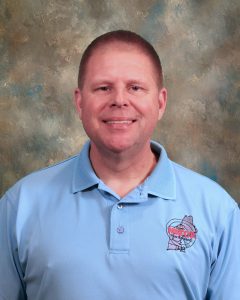
Today we reflect on the life and legacy of Dr. Martin Luther King Jr and the ideals of equality which led to the passage of the Civil Rights Act of 1964 and the Voting Rights Act of 1965. These ideals we remind ourselves of yearly must be defended and protected. Just as in our country, each generation is called to perfect our Union. As a Union, we are called to protect our rights. Often when Collaboration Facilitators are consulted on an issue, we find errors in the application of the collaborative process. One such problem occurs when Article 114 is viewed as optional. Maybe it is because collaboration is perceived as taking too much time or that there is a mandate coming from an outside entity. Maybe an airline, an airport authority, a general manager, or an LER/ETR. In these cases, we hear the argument made by management they are going to do what they want anyways, and the Union can just grieve it.
Now, I am not saying that Article 9 does not have its place; sure it does. Rather when we see attempts to bypass or placate collaboration (Article 114) by not adhering to the premise of making a genuine effort to develop a solution that satisfies as many interests as possible before a decision is made, it is our job to assist the collaborative partners in returning back to the collaborative process.
Oftentimes, the error occurs when the first step of Interest Based Communication, is forgotten, treating each other as equal participants. When the order comes down from above, managers can feel they have no choice and need to implement it. If this occurs, Reps need to remind their counterpart of the correct process, and if this does not work, ask to work with the CF team. Remember, both of you are equal participants. Different roles, but equal in dealing with the issue. A genuine effort needs to be made to develop a solution that includes as many interests as possible. Often times this is the first time in the process where a collaborative pairing is evaluating the issue and sharing interests. Those other entities mentioned above that pushed that mandate on the facility did so without a collaborative counterpart and it is through collaboration that we get better results.
New England Communications Survey
Your NATCA New England Communications Team works hard behind the scenes to keep you updated with the most important updates and information including these emails along with social media posts.
To be able to provide members like you with the most relevant information, they need to hear from you to ensure they are putting out high-quality, relevant products.
Please click here to take a short survey to give the NNE Communications Team your feedback on your communications preferences. Help them understand what topics our members want to hear about most.
Legislative
From Jamie Green, NATCA New England Legislative Chair, PVD
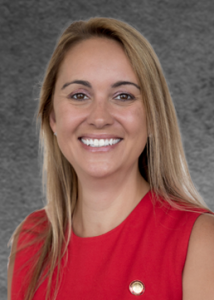
As we begin 2024, your legislative team has been gearing up for another busy year. The FAA Reauthorization deadline has been extended until March 8th, and there is still no resolution to pilot issues that have hindered the bill in the Senate. NATCA continues to work with members of Congress to try to pass a multi-year bill. Floor time with this bill will likely be an issue due to Congress’ being focused on funding the government.
With yet another deadline for funding expiring on January 19, a potential shutdown is the main focus. Top-line numbers have been agreed on recently however, there are no guarantees, as we all know. There is now a framework for appropriators to work with, although, time is an issue. We are hopeful for a short Continuing Resolution (CR) and then a funding bill later.
As the shutdown date approaches, NATCA is monitoring the situation and preparing accordingly. Currently, there are many unknowns. Please contact your local legislative team if you have any questions. We have been working on strategies to end the shutdown and continue funding.
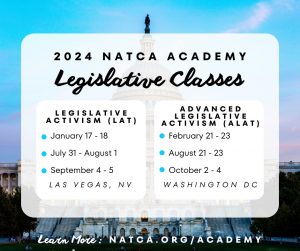
2024 is an election year. Soon, your local legislative team will be reaching out for volunteers. Please take this time to sign up to help and engage in our activism. NATCA is effective in conveying our message because of how engaged our membership is!
Also, I highly recommend taking one of NATCA’s Legislative Activism training classes. In these classes you will learn more about the legislative process and how NATCA builds relationships with members of Congress to help move forward our priorities on Capitol Hill. You can sign up for these classes on the NATCA portal.
Disaster Response Committee
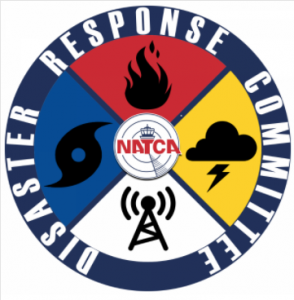
NATCA established a disaster relief fund in 1992 in the wake of Hurricane Andrew in Florida. Following the devastating 2017 hurricane season, NATCA formed the Disaster Response Committee (DRC) to manage the disaster relief fund and organize the relief process for NATCA members affected by a disaster. Due to the generosity of our membership, our fund has continued to grow and has provided assistance to those members affected when disaster strikes.
We in New England are lucky to not need the services of the DRC very often, but when we do (like recently with flooding and snowstorms throughout our region), they are well prepared to give our membership information and support. They provide preparation checklists ahead of hurricanes, they are ready to deploy crews with generators and flood mitigation equipment when floods hit, and are available with chainsaws to help deal with downed trees from snow storms with high winds. These are just a few examples of how the DRC can assist our members.
The DRC cannot provide our membership with this very important help without your donations. Please consider a one-time donation or sign up for a regular donation from your paycheck. Any amount is helpful and much appreciated by our brothers and sisters who are affected by natural disasters!
- Donate through GoFundMe
- PayPal your donation to [email protected]
- NATCA Members can sign up for automatic payroll deduction.
- Mail personal checks, payable to “Disaster Relief Fund” to:
NATCA
Attn: Accounting Department
1325 Massachusetts Ave. NW
Washington, D.C., 20005 - NATCA Disaster Response Committee (DRC) page
Safety
From Seth Myers, NATCA New England Safety Rep, ZBW

Finding and fixing problems is the fundamental purpose of our safety management system and the quality control process. In the past we have spoken about some of the sections in the ATO Quality Control order 7210.634A. We have talked about Quality Control Monitoring and operational skills assessments (OSA). Review processes such as system service reviews (SSRs), and traffic management reviews (TMRs). As well as compliance verification processes such as Internal compliance verifications (ICVs) and external compliance verifications (ECVs). What we have not covered yet is what happens when these processes identify risk or non-compliant items? How are we supposed to fix these issues?
Chapter 7 of the QC order outlines a process called a corrective action plan (CAP). CAPs are actions taken by facilities to correct non-compliance or risk. CAPs are the method a facility must use to document implemented corrections to validated systemic non-compliance or identified risk.
CAPs may be generated from service reviews, compliance verifications, QC validations, significant events, LSC analysis as well as other processes outlined in the QC order. Collaborative CAP teams must create CAPs that are designed to correct the specific problem and have an implementation process. These CAPs will include how the effectiveness of the mitigation will be measured, and develop a monitoring plan. Facilities must document CAPs within CEDAR to maintain a record of implemented corrections.
Now that you understand a little about this process you should ask yourself some questions. Do you know how the CAP process works at your facility? At your facility do you have any CAPs? Who from your facility is on the collaborative team? If you don’t know the answers to these questions, reach out to your FacRep, facility safety rep, or your local safety council.
Corrective Action Plans are an integral piece of the safety management system we operate under. This collaborative process is vital in keeping our airspace system running safely.
2023 Year in Review
Our January 1st email included New England’s Year in Review video. If you missed it, you still have the opportunity to watch it on our YouTube channel! The video includes 2023 recaps from many of your New England leaders and announces our 2023 winners for the Jay Bowers Activism Award and Curt Fischer Leadership Award.
Announcements and Information
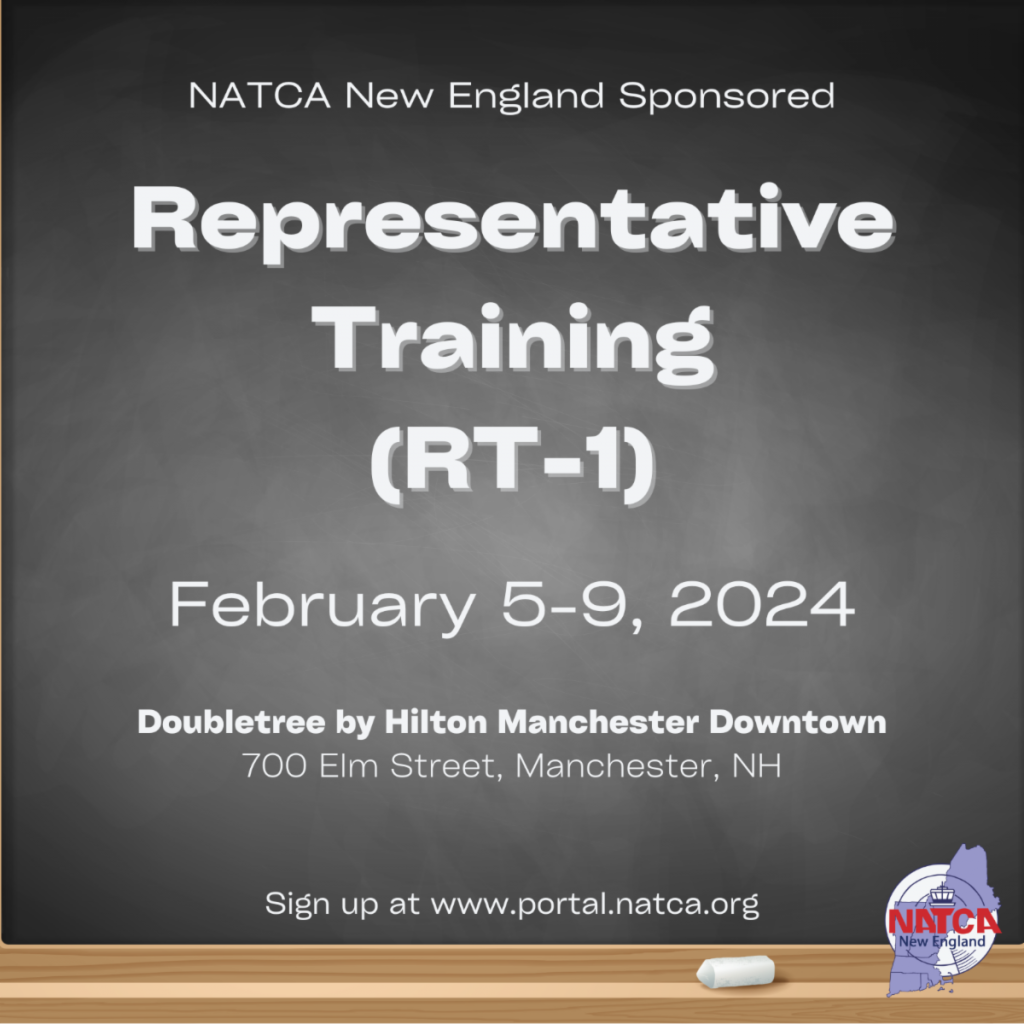
Have you signed up yet? Don’t let the opportunity to take RT-1 locally pass you by!
New England will be hosting a full RT-1 class in Manchester, NH on February 5-9, 2024. The class will be held at the Doubletree by Hilton Manchester Downtown and the deadline to sign up is this Thursday, January 18. We recommend signing up if you are interested in attending but are unsure if you will be able to.
If you will be a new representative next year or think that being a representative may be in your future, you should attend this class! This is a unique opportunity to take RT-1 in the local area without having to travel all the way out to Las Vegas, where the class is normally held.
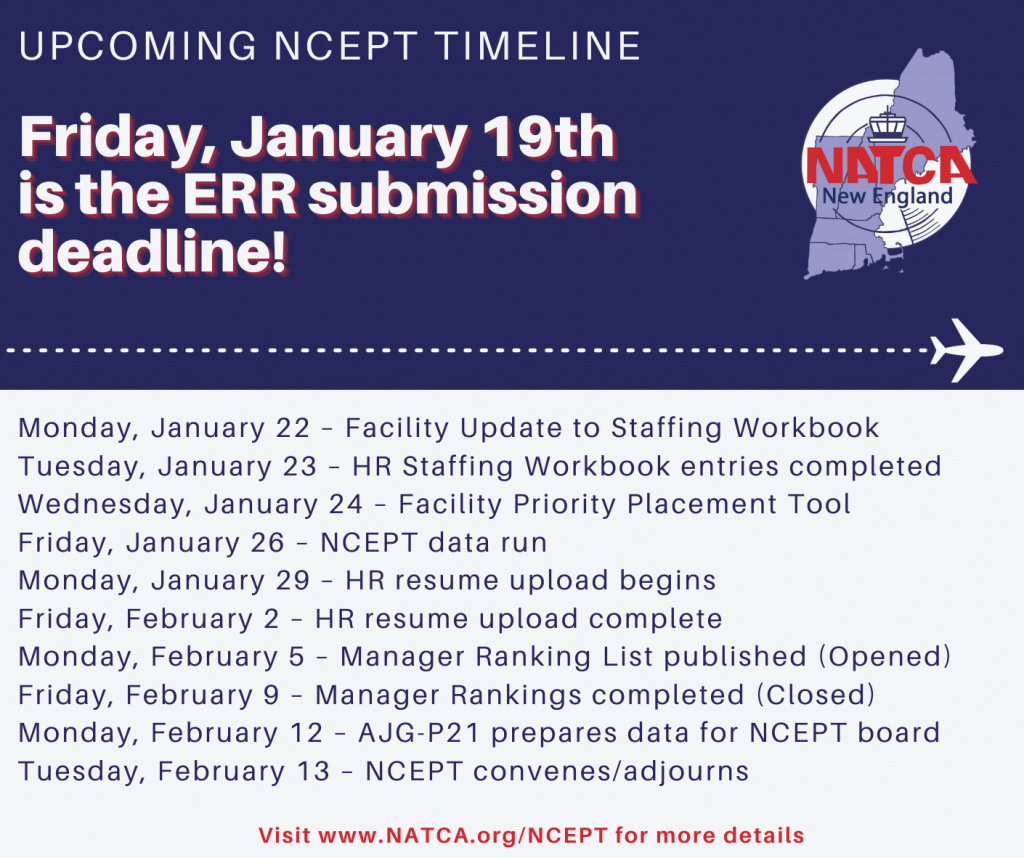

Do you know a NATCA member who represents professionalism to you and stands out as an example for the positive impact they make in their job?
If so, now is the time to recognize that individual for their ability to bring honor and respect to their job by nominating them for the NATCA National Professionalism Award.
Each year, NATCA recognizes one recipient from each FAA Service Area, a minimum of 3 individuals, who go above and beyond to demonstrate professionalism through their commitment to safety and upholding the public’s trust in our work.
Nominations are open now through June 1, 2024. The awards will be given out at Communicating for Safety (CFS)- next year’s event will be held September 16-18, 2024.
The nomination form and more information on NATCA’s Professional Standards Committee, can be found at https://natca.org/committees/ps/
